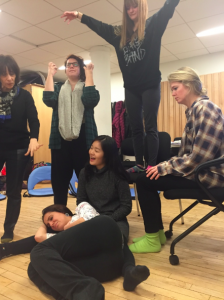
Drama therapy refers to the use of theatrical techniques to promote healing, foster change, and develop personal growth and well being. It is often confused to be a modality limited to children or actors when in fact it can serve as a cathartic, transformative tool for therapeutic purposes. Drama therapists use all types of projective techniques and forms of embodied work to help clients to closely examine the human experience and relate these insights back to their own stories. Whether it is story telling, metaphor, improv or performance, using drama allows clients a safe space to use their creative problem solving skills, pretend, and tap into their childlike imagination.
If you consider the idea that we are essentially the authors of our own life story, it can be posited that we perform our lives by alternating our roles every single moment to adapt to certain situations. For example, imagine a 30 year old mother who works a full time job, raises two children, is an avid volunteer at a local church, and enjoys running long distance and playing piano in her spare time. In this one provided example, we can distinguish countless roles that this individual has to constantly shift in between in order to maintain order: mother, business owner, philanthropist, caregiver, wife, hero, athlete, and artist just to name a few. What is not so obvious are all of the other roles that we shift between that make us unique human beings.
While these roles may be clearer, this individual might also shift between roles such as victim, sick person, or inner critic. A distinct goal of the drama therapist is to acknowledge these roles, and offer the ability to expand or alter this list based on the individual’s personal goals. This is achieved and explored by engaging the client in creative forms of play. As a creative arts therapist, I offer the client a myriad of different modalities in order to personalize their experience in a customized fashion that not only creates a safe space to explore different forms of self expression, but also allows client’s the freedom to choose how they would like to work and to choose how they would like to write their own story. This also initiates autonomy which seems to be a common goal with many of our clients.

Another benefit of utilizing drama within therapy is the option that is presented to clients regarding re-authoring their personal stories and narratives. It can be an uncomfortable process to make significant changes in our lives, but by using drama, we have the ability to try on different realities through the use of play and pretend. Through the artform of creative problem solving and improvisation, clients have the ability to gain insight regarding new ways to view and acknowledge these transitions. It essentially allows for the client to take risks without fear of failure or consequence, but they are allowed to test the waters of different realities. It has often been asserted that the main blocker for creative energy is fear. By working with the fear instead of trying to eliminate it, new discoveries can be considered and explored in ways that can be hard to put into words. This is also where the beauty of embodiment comes into play.
Delving into therapy takes a brave individual and can be an extremely vulnerable, uncomfortable time period. Not only does it require a level of trust between therapist and client, it can bring up a lot of suppressed emotions for a client. Through drama and story telling, the therapist is able to provide a layer of what we like to call “aesthetic distance”. This term refers to the idea that the client is one step removed from their own personal narrative by working through metaphor or pretend.
Tapping into the ability to play and be given permission to take risks has shown to foster spontaneity and creativity, allow individuals a new take on creatively problem solving, reduce cortisol levels, and promote self worth from the act of creating and contributing. As human beings, we are constantly facing new battles and waves of life. Drama therapy allows us to tap back into that playful spirit that can often get lost in the mess of the human experience.
“Under the guise of play and pretend, we can – for once – act in new ways. The bit of distance from real life afforded by drama enables us to gain perspective on our real-life roles and patterns and actions, and to experiment actively with alternatives.” -Renee Emunah


